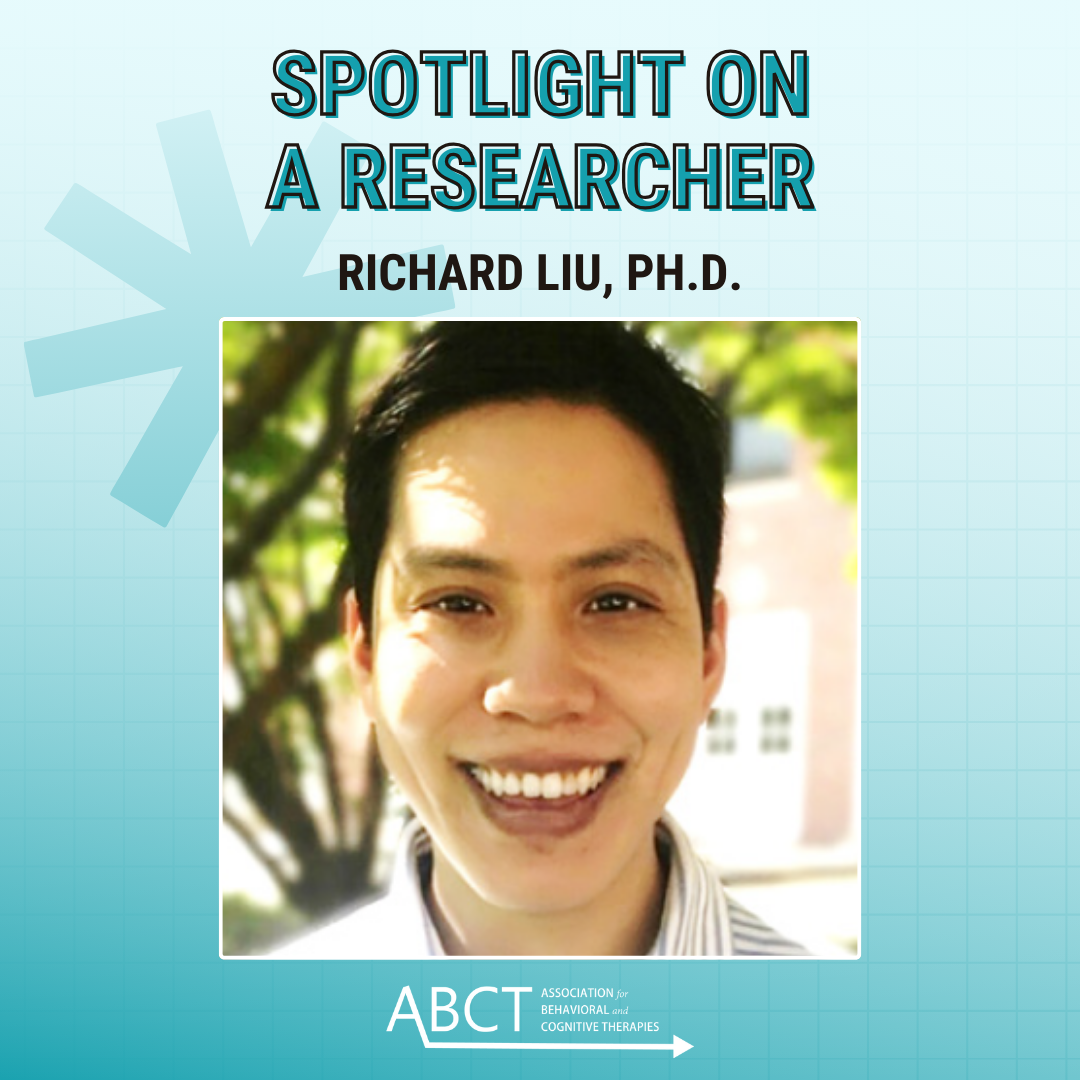Find a CBT Therapist
Search through our directory of local clinicians.
Richard Liu
Spotlight on a Researcher

Richard Liu, Ph.D., is an Associate Professor at Harvard Medical School and the Director of Suicide Research in the Division of Child and Adolescent Psychiatry at Massachusetts General Hospital. He is the Editor-Elect of Behavior Therapy and an Associate Editor of the Journal of Psychopathology and Clinical Science. In The Mood and Behavior Lab, his research program focuses on characterizing dynamic processes of risk underlying onset and recurrence of self-injurious thoughts and behaviors (SITBs) and depression in youth and emerging adulthood.
His programmatic interests lie in advancing our understanding of SITBs and depression from who is at risk to how and when they are most at risk, with a particular focus on stress processes and neurocognitive mechanisms of risk. His work thereby aims directly to inform risk assessment strategies and yielding potential targets for clinical intervention, as well as characterizing risk for SITBs in a high priority, at risk population, sexual and gender minority youth. His research has been supported by the National Institute of Mental Health, the American Foundation for Suicide Prevention, and the American Psychological Foundation.
Dr. Liu responded to questions from ABCT’s Research Facilitation Committee about his experiences in research.
How long have you been a member of ABCT?
I have been attending ABCT since 2007, so almost 17 years.
What tips can you offer to colleagues trying to start a research lab or begin a career in research?
Something that we are typically not taught in graduate school is how to build and manage a successful lab, and yet this is so critical for an early career researcher. The most important thing for launching a successful lab is not one’s ideas and resources; it is the lab personnel. I have seen across multiple labs how the first hires have an outsized influence in establishing the lab’s culture.
This is why I recommend sparing no expense in terms of investment of time needed to identify your first hires and ensuring that they are a good fit with the environment that you envision for your lab. I find it a very positive sign if during an interview the applicant asks, without any cues, about opportunities for them to provide mentorship to more junior trainees. This often bodes well in terms of the applicant sharing the vision I have for a supportive and collaborative lab culture.
What have you found most rewarding about your research?
For me, it ultimately comes down to two things: the people with whom I work and the work that I do. By this, I mean that I have the good fortune to be part of a warm and supportive lab culture, to work in a collaborative and collegial environment, to have wonderful collaborators, and to engage with youth in my studies who never cease to entertain me with their humor and personalities. I also believe I am quite fortunate to be doing research I feel passionate about, both in terms of the intellectual challenges that it provides and the potential it has to yield benefit to others.
What is an example of a set-back you’ve experienced in your work, and how did you handle it?
When I applied for graduate school, I had only one interview and received an offer off the waitlist just four days before the April 15 acceptance deadline. Then, when I applied for internship, I received only three interviews and did not match, leaving me to find an internship spot through the clearing house. In both cases, I was incredibly fortunate to have landed in excellent programs that provided me with the training and opportunities that served as the foundation for my current work. I believe these early career experiences have instilled in me the fortitude to persevere when confronted with future challenges. Looking back years later, it is also very clear to me what I could have done differently to be a stronger candidate, and this has motivated me to ensure that my mentees benefit from my knowledge and experience to optimize their professional development.
If you weren’t pursuing a career in psychology, what would you be doing?
When I was growing up and throughout college, my dream was to be a poet, writing verse in rhyme and meter in the style of Romantic and Victorian poets. I may have spent more time reading poetry than on my classes’ assigned readings! If I were to say now what I would be doing if I were not a clinical psychologist, I think I may have wanted to pursue a career in oncology or virology. Or perhaps I would have been a marine biologist helping newly hatched sea turtles find their way to the ocean.
